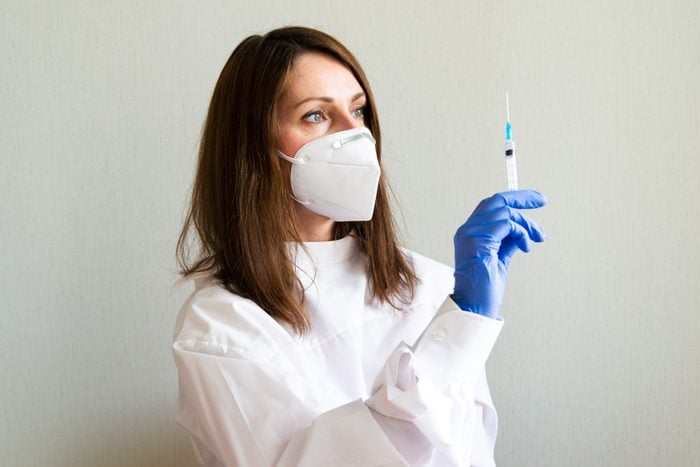What You Need to Know About COVID-19 Vaccines and Your Period

Anecdotes of weird periods post-vaccination have been circulating online — is there a link?
Update: On Sept. 16, Pfizer-BioNTech and Moderna vaccines received full approval from Health Canada as well as new brand names. The Pfizer-BioNTech vaccine is now “Comirnaty,” the Moderna vaccine is now “SpikeVax” and the AstraZeneca vaccine is now called “Vaxzevria.”
Typically, 23-year-old Torontonian Abbie Moser’s periods are light and painless. But, after receiving her first dose of the Pfizer-BioNTech COVID-19 vaccine on day three of her period, her usually light flow became heavier and she experienced the worst cramps of her life. Her period even lasted a couple days longer than normal.
“I don’t normally get heavy cramps or anything, I don’t need to take Advil to subdue my period symptoms either,” she says. “But I had to take Advil multiple times a day every day until [my period] was done because the cramps were so bad. I could hardly do anything.”
Moser isn’t alone. Since COVID-19 vaccines started getting administered around the world, numerous social media users have posted about menstrual cycle changes, which people speculate are linked to the vaccines.
Commonly reported COVID-19 vaccine side effects include a sore arm, itching or redness at the injection site, headache and fever. But could menstrual changes also make the list? We spoke to Dr. Cora Constantinescu, a pediatrician and infectious disease specialist at the Alberta Children’s Hospital in Calgary, about what you need to know about COVID-19 vaccines and your period.
(Related: Moderna vs. Pfizer: Why We’re Not Playing Favourites with COVID-19 Vaccines)
So, is there a link between the COVID-19 vaccines and menstrual cycles?
In short, we don’t really know. “It’s not something that’s studied in vaccines,” says Constantinescu. “[Menstrual changes weren’t] part of the initial trials. It isn’t even one of the side effects that people tend to think about.”
That said, there is a “biological plausibility” that periods are affected by COVID vaccines, says Constantinescu. Menstrual cycles can be affected by lots of things like stress, rigorous exercise and medication, just to name a few. So, it’s possible that getting vaccinated could affect your period in the short term. But—and Constantinescu stresses this point—any COVID vaccine-related changes to your period will be temporary.
“There is no biological possibility that this is going to be a long-term thing,” she says.
(Related: What Is Period Flu? Here’s What You Should Know)
Then what’s going on with people who are having weird periods?
Since changes in menstrual cycles and vaccines hasn’t been studied, there’s no way to definitively say exactly what’s going on. But, with the number of people sharing similar stories, Constantinescu says, “there’s probably something to it.”
One possibility is that menstrual cycles are being thrown off because of stress. In Ontario, for example, snagging a vaccine appointment has meant waiting anxiously on the phone, in a virtual queue or in an hours-long line at a pop-up clinic. One article published by the Centre for Menstrual Cycle and Ovulation Research notes a striking similarity between the post-vaccine anecdotes coming out now and a study that highlighted health issues in individuals who had been tear gassed by police at Black Lives Matters demonstrations in Portland last summer — a major issue being period changes. The article suggests that acute stress (leading to an increase release of stress hormones) is behind the weird periods in both scenarios.
It’s also possible that these abnormal periods have to do with your immune system, says Constantinescu. Immune cells play a role in building up and breaking down of the uterus lining (which thickens during ovulation and sheds in the form of a period if the egg isn’t fertilized). So, in theory, since the vaccine is meant to induce an immune response in your body, this immune response could have a short-term impact on the menstrual cycle.
Another possibility is that we’re just bad at knowing what a “normal” period is. “What some people think are heavy periods, when they quantify it, it’s shocking how different the perception was versus the quantification,” says Constantinescu. Because people are already on the lookout for side effects and are likely more aware of their body than usual after being immunized, they might be noticing changes that may or may not be caused by the shot. But, again, we won’t know unless studies are done, especially since this is such a “notoriously subjective area,” according to Constantinescu.
(Related: Get the Vaccine, Drop the Guilt)
Will this affect my fertility?
The good news is that there is absolutely no evidence that the COVID-19 vaccines (regardless of the brand you receive) affects your fertility. Plus, any COVID-19 vaccine related changes to your menstrual cycle are likely short-term. “I don’t think there’s anything long-term here that people need to worry about,” Constantinescu says.
(Related: Here’s What You Need to Know About COVID-19 Vaccines and Infertility)
What can I do if I think my period’s been affected by the COVID vaccine?
For starters, don’t panic. Again, menstrual cycles get messed up all the time for a variety of normal reasons. But, if you do feel like you’re having a reaction to the vaccine that’s out of the ordinary, Constantinescu urges you to speak with your doctor and report it.
When people report adverse reactions to vaccines, it creates something called a “signal,” which indicates how many people have reported a problem and prompts Health Canada to review the data, explains Constantinescu. “If you think it’s happening to you, report it because how else are we going to learn.”
I’m scared I’ll have horrible cramps if I get vaccinated! What can I do?
It’s totally normal to worry about how and if the COVID-19 vaccine will affect you. But, ultimately, the benefits of being vaccinated far outweigh the side effects.
If you’re worried about having a painful period or heavier flow after getting vaccinated, set yourself up with all the essentials. This might be as simple as stocking up on menstrual products or making sure your over-the-counter painkillers are ready to go.
“You know your body well, and if there’s something you can do to mitigate these potential side effects, go for it,” says Constantinescu. “There’s no doubt in my mind that you should get the vaccine, but that doesn’t mean [these concerns] aren’t real. It just means asking yourself ‘how can I mitigate them and make myself comfortable’.”
Next, this is how to talk to your vaccine-hesitant loved ones about the shot.




